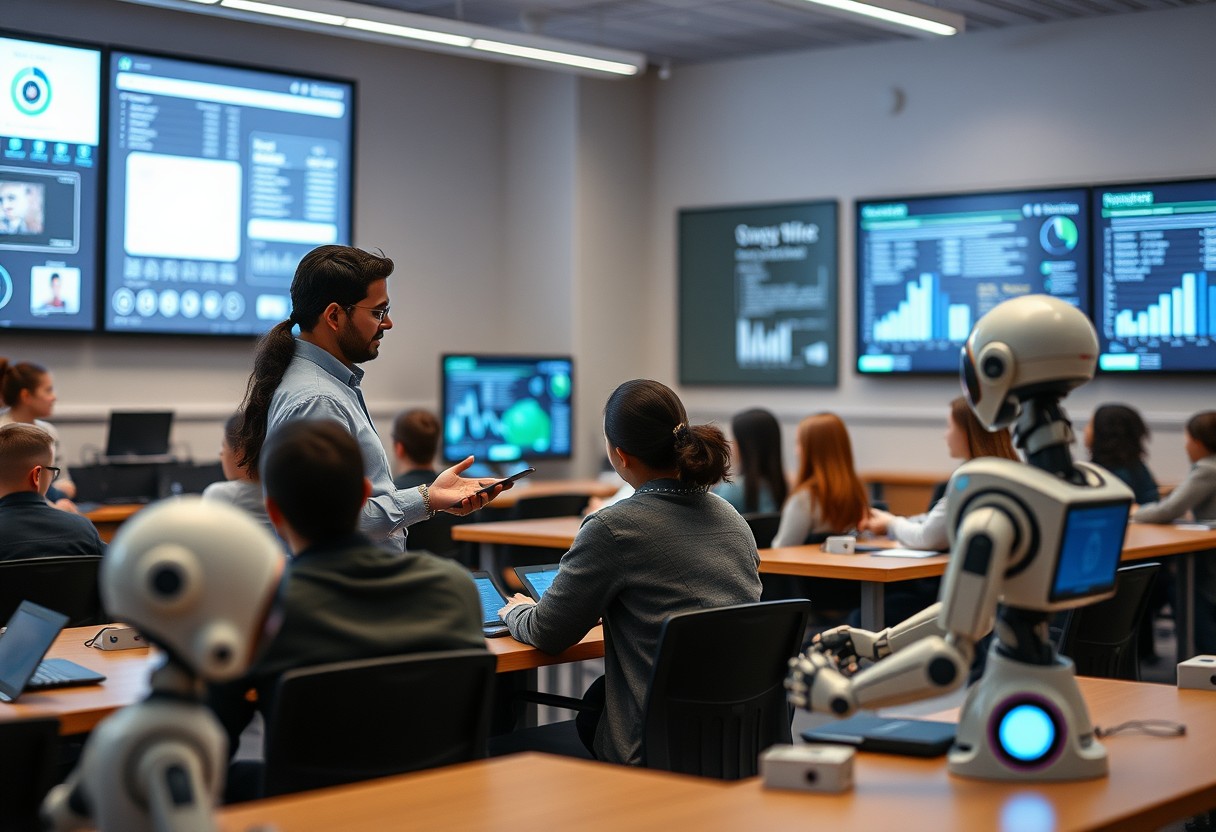Most educators and students are seeking innovative ways to enhance the learning experience, and the Human Learnome Project is at the forefront of this movement. By leveraging advanced AI technologies, this initiative tailors educational content to meet your unique learning styles and preferences. This blog post will explore how the Learnome Project utilizes cutting-edge techniques to create individualized learning pathways, making education more effective and engaging for you. Discover how these developments in artificial intelligence can transform your educational journey.
Key Takeaways:
- Personalized Learning Pathways: The Human Learnome Project leverages AI to create tailored educational experiences based on individual learning styles and preferences.
- Data-Driven Insights: By analyzing a vast array of data, the project provides insights into students’ strengths and weaknesses, enhancing targeted learning interventions.
- Adaptive Assessment Tools: AI technologies facilitate adaptive assessments that adjust difficulty levels in real time, ensuring that learners are both challenged and supported adequately.
- Collaborative Learning Environments: The initiative fosters collaboration between learners and educators, using AI to recommend collaborative opportunities that enrich the learning experience.
- Continuous Feedback Mechanisms: The integration of AI allows for ongoing feedback, helping students to track their progress and educators to adjust teaching strategies effectively.
Understanding the Human Learnome Project
Definition and Objectives
To grasp the essence of the Human Learnome Project, you first need to understand its definition. This initiative aims to explore into the intricacies of how human learning occurs by meticulously mapping the unique traits and experiences that contribute to individual learning styles. The project focuses on creating a comprehensive database rich with diverse data points that can inform educational practices and technologies. Its primary objective is to use this knowledge to foster personalized education tailored to the needs of each learner.
Human learning is not a one-size-fits-all experience; it involves various dimensions, including cognitive, emotional, and psychological aspects. The Human Learnome Project seeks to distill this complexity into actionable insights. By doing so, it aspires to develop advanced AI technologies that provide personalized recommendations, learning materials, and methodologies, all aimed at enhancing your educational journey.
Historical Context
Across the decades, the paradigm of education has evolved significantly, transitioning from traditional teaching methods to more individualized approaches. This shift began as researchers and educators recognized the limitations of uniform teaching models that often neglected the diverse learning needs of students. As a result, there has been a growing interest in understanding the factors that influence your learning experiences, leading to initiatives like the Human Learnome Project.
At the same time, advancements in technology have fueled innovative approaches to education. The capabilities of artificial intelligence and data analytics have opened new avenues for analyzing learning patterns, making it easier than ever to tailor educational experiences. The Human Learnome Project stands as a culmination of this historical evolution, marrying educational research with cutting-edge technology to address the unique learning requirements of individuals today.
Key Components of the Learnome
Objectives framework serves as the backbone of the Human Learnome Project. It is designed to identify key elements influencing human learning and to analyze how these elements interact with each other. A significant part of this framework includes the development of algorithms that can assess your learning preferences and styles. By leveraging your personal data, the Learnome aims to provide insights that facilitate deeper understanding and enhance educational outcomes.
As you navigate through your educational journey, the key components of the Learnome not only focus on gathering data but also emphasize the importance of learner engagement and motivation. This focus allows the project to create a holistic learning environment that empowers you to take charge of your education while benefiting from personalized support and resources.
Historical advancements in educational psychology and the growth of computational power have set the stage for the Human Learnome Project. By merging insights from these fields, the project aims to create a nuanced understanding of individual learning pathways. This historical context aids in appreciating how far we have come and how the intersection of technology and education can pave the way for future learning innovations.
The Role of AI Technologies in Personalized Education
Now, as you’re exploring personalized education, it’s important to consider the transformative role that artificial intelligence (AI) technologies play in this sector. With the growing demands for tailored educational experiences, AI is stepping in to provide insights and solutions that meet individual learning needs and styles.
Overview of AI in Education
Below, you will discover how AI can revolutionize your educational journey, offering real-time feedback and adapting to your progress. This dynamic approach ensures that lessons are not only engaging but also effective, catering specifically to how you learn best.
Types of AI Technologies Used
Below, various AI technologies are influencing personalized education, shaping the way you interact with learning materials. These include:
| Technology | Description |
| Machine Learning | Analyzes data to predict and suggest individualized learning paths. |
| Natural Language Processing | Enhances communication between students and educational tools, improving comprehension. |
| Adaptive Learning Systems | Modifies content delivery based on your performance and preferences. |
| Chatbots | Provide instant support and answers to your queries, facilitating continuous learning. |
| Data Analytics | Generates insights from your learning progress, helping educators tailor interventions. |
Thou can leverage these technologies to deepen your understanding and engagement in your educational journey. Each type of AI technology serves a unique purpose, contributing to an overarching goal of creating a more personalized learning experience.
- Machine Learning can process vast arrays of data to tailor educational content.
- Natural Language Processing aids in making learning materials more accessible.
- Adaptive Learning Systems ensure lessons are adjusted according to real-time feedback.
- Chatbots enhance the availability of support, acting as a reliable learning companion.
- Data Analytics provides educators with insights, allowing for more informed teaching strategies.
Also, you should explore the benefits that come with integrating AI technologies in your learning. These advantages can significantly enhance how you engage with the content, foster collaboration, and improve overall academic outcomes. Notably, AI facilitates:
| Benefit | Description |
| Individualized Learning | Tailors educational experiences based on your specific needs and learning styles. |
| Enhanced Engagement | Utilizes dynamic content to maintain your interest and promote deeper learning. |
| Flexibility | Allows you to learn at your own pace, adjusting the tempo as required. |
| Tangible Feedback | Provides real-time assessments to help you identify strengths and areas for improvement. |
| Increased Accessibility | Makes learning resources available to a wider range of students. |
Used effectively, AI-driven personalization can reshape your educational landscape, providing experiences that are uniquely yours. With the combination of these technologies and their respective benefits, you will find your learning journey becomes increasingly meaningful and productive.

Data Collection and Analysis
Keep in mind that effective personalized education relies heavily on thorough data collection and analysis. The Human Learno-me Project uses advanced AI technologies to gather insights about individual learners, ensuring that educational strategies are tailored to meet their unique needs. This process begins by identifying learning styles, which is foundational to understanding how you or your students best absorb and retain information.
Identifying Learning Styles
Identifying the distinct learning styles of individuals involves assessing how you engage with different types of information. Whether you are a visual, auditory, or kinesthetic learner, recognizing your preferred methods can significantly influence the way educational content is delivered. The Human Learnome Project employs sophisticated algorithms to analyze preferences, leading to a more effective educational experience tailored specifically for you.
Gathering Learner Data
Learner data plays an important role in the personalization of education. The collection process encompasses various parameters, including academic performance, engagement levels, and behavioral patterns, which can all provide insights into your learning journey. Using AI, the project systematically gathers this data from diverse sources, ensuring a comprehensive understanding of your educational needs.
Plus, this collection is designed to respect your privacy while providing valuable insights that inform your personalized learning path. By aggregating data from different platforms and learning environments, the Human Learnome Project can create a richer, more detailed profile of you as a learner. This foundational information becomes the bedrock for tailored educational solutions, enhancing your learning experience.
Analyzing Patterns and Trends
Any effective educational strategy must also involve analyzing patterns and trends found in the gathered learner data. The Human Learnome Project utilizes AI to sift through large volumes of information, identifying correlations that reveal not only your personal learning style but also broader trends within groups of learners. This analysis helps educators understand how to optimize learning experiences beyond the individual level.
In fact, this analytical approach allows for the recognition of emerging trends in educational methods and outcomes, providing vital feedback on what techniques work best. By continuously evaluating and updating these insights, the Human Learnome Project ensures that your learning experience remains dynamic, adapting to both your evolving needs and the collective experiences of learners like you. This leads to better outcomes as it fosters an educational ecosystem that is both responsive and innovative.
Customizing Learning Paths
After exploring the innovative avenues presented by the Human Learnome Project, you’ll find that personalizing education through AI technologies strongly hinges on creating customized learning paths for each learner. This approach recognizes that every individual has unique strengths, weaknesses, and preferences when it comes to acquiring knowledge. By tailoring learning experiences to fit your specific needs, you can engage more deeply and effectively, resulting in better educational outcomes.
Adaptive Learning Environments
Below, adaptive learning environments play a pivotal role in customizing your educational journey. These environments utilize AI algorithms to analyze your performance and adapt content in real-time, ensuring that you are always faced with the right level of challenge. With this technology, you can progress at your own pace, focusing on areas that require more attention while quickly moving through topics you find easier. This personalized approach not only enhances your engagement but also fosters a deeper understanding of complex subjects.
Resource Allocation and Recommendations
Environments that support personalized learning also excel in resource allocation and recommendations tailored to your learning style. AI systems analyze your interactions and progress to suggest specific resources that will benefit you the most, whether they be articles, videos, or interactive exercises. This means that instead of sifting through a plethora of materials, you receive direct access to content that aligns with your individual needs and interests, allowing for a more streamlined and effective learning experience.
In fact, the ability to provide tailored resources based on your unique learning path creates a more efficient educational framework. By focusing on what is most relevant to you, the Human Learnome Project harnesses AI technologies to eliminate the noise of irrelevant content, thereby enhancing your focus and retention. This streamlined approach ensures you are not only learning but also applying knowledge in ways that resonate with your personal learning style and goals.
Real-Time Adjustments in Learning
Among the standout features of personalized education through AI is the capability for real-time adjustments in learning content. As you engage with educational materials, AI systems continuously gather data on your interactions, quickly identifying trends in your understanding and retention. Based on this information, the system can automatically modify the difficulty of tasks, provide additional practice, or introduce new concepts that align with your current progress. This dynamic adaptability keeps your learning experience relevant and effective.
Adjustments made in real-time ensure that you are always learning at an optimal pace. Whether you need extra support in a challenging area or are ready to tackle advanced topics, these responsive systems allow for an educational experience that feels tailored just for you. Engaging with a program that dynamically adjusts to your needs not only reinforces your confidence but also promotes a resilient learning attitude—key components in fostering lifelong learners who are equipped for success in diverse environments.
Enhancing Student Engagement and Motivation
Your journey in education can significantly benefit from enhanced engagement and motivation, pivotal elements that the Human Learnome Project emphasizes through its innovative approach. By leveraging AI technologies, the project creates personalized learning experiences that inspire you to be more active participants in your education. This engagement leads to a more profound connection with the material, making learning not just a task but an exciting adventure.
Gamification and Interactive Learning
Motivation fuels your desire to learn, and gamification plays an necessary role in enhancing that motivation. The Human Learnome Project incorporates game-like elements into educational contexts, transforming traditional learning into an interactive experience. You can earn points, complete challenges, and even compete with peers, fostering a sense of achievement and purpose that keeps you invested in your studies.
In addition, interactive learning environments enable you to explore subjects in an engaging manner, allowing for hands-on experiences that reinforce knowledge retention. By manipulating variables, solving puzzles, or collaborating with fellow learners in real-time, you not only grasp concepts more effectively but also look forward to continuing the learning process, breaking away from monotonous routines.
Personalized Feedback Mechanisms
Any journey toward understanding is heavily influenced by feedback, and personalized feedback mechanisms within the Human Learnome Project can provide you with tailored insights that directly address your needs. Through advanced AI-driven analytics, you receive immediate responses to your performance, highlighting areas for improvement and encouraging you to build on your strengths. This targeted approach helps you stay motivated and engaged, as you can clearly see your progress and identify specific goals to work toward.
Learning becomes a more dynamic process when you have access to continuous personalized feedback. Instead of waiting for end-of-term evaluations, you receive real-time assessments that guide your study patterns and strategies. This instant feedback loop not only enhances your understanding but also fosters a growth mindset, enabling you to approach challenges with confidence and a willingness to improve.
Building a Supportive Learning Community
Among the many ways to enhance engagement, building a supportive learning community stands out as a key factor in your educational experience. The Human Learnome Project emphasizes collaboration among learners to create an environment where you feel valued and understood. Being part of a community where you can share ideas, ask questions, and celebrate successes together fosters a sense of belonging that can motivate you to persevere through challenges.
Even within this supportive atmosphere, you can develop meaningful connections with peers and mentors alike, forming relationships that transcend the classroom. Such a network not only enhances your learning experience but also inspires you to contribute actively, as you realize that your participation has a positive impact on others, making the educational journey all the more enriching.
Challenges and Ethical Considerations
All advancements in educational technology, particularly those involving AI, come with a set of challenges and ethical considerations that you need to be aware of as you explore the Human Learnome Project. As you implement personalized learning strategies, understanding the implications of using AI on education is key to maintaining a respectful and effective learning environment. Addressing these concerns head-on will ensure that the potential benefits of AI technologies do not overshadow the ethical responsibilities that come with their use.
Privacy and Data Security
With the integration of AI technologies into educational settings, the privacy and security of personal data become paramount. As you engage with the Human Learnome Project, it’s crucial to consider how student data is collected, stored, and analyzed. This project utilizes vast amounts of information to tailor learning experiences, but safeguarding that data is crucial to prevent unauthorized access or misuse. Ensuring compliance with privacy regulations and ethical standards will be fundamental in fostering trust between educators, students, and their families.
With evolving technologies, formative assessments and learning pathways can sometimes lead to unintended exposure of sensitive information. Thus, it is imperative that you advocate for robust data protection measures. This includes implementing clear consent protocols and ensuring transparency about data usage so that all stakeholders are fully informed and engaged in decisions that affect their privacy rights.
Equity in Access to Technology
By leveraging AI in personalized education, you address the educational disparities that some students face due to varying levels of access to technology. However, the development and implementation of the Human Learnome Project also raise questions about equity in access. You must consider whether every student has the necessary tools and internet connectivity to benefit from personalized learning. Such disparities could reinforce existing inequalities in education rather than mitigate them.
By recognizing these challenges, it’s critical that you advocate for solutions that ensure equal access to technology for all students. Promoting initiatives that provide required resources, like affordable devices and internet connectivity, can help bridge the gap. As you aim for a more inclusive educational environment, collaborating with community organizations and policymakers can help to drive systemic change that benefits every learner.
The Role of Educators in AI-Driven Environments
Before fully integrating AI technologies into your educational practice, you must understand the evolving role of educators in these AI-driven environments. While AI can provide valuable insights and personalized learning plans, it’s the educator’s expertise and relational skills that foster deeper learning experiences. You will need to balance the use of AI tools with your professional judgment to create a supportive and engaging learning atmosphere.
Before moving forward, consider how your role as an educator will change. With AI handling data analysis and customizing learning pathways, your ability to connect with students on a personal level will be more important than ever. You will need to interpret AI-driven data insights and translate them into actionable teaching strategies, all the while maintaining your central position as a mentor and facilitator of learning.
Also, you have the unique opportunity to act as a bridge between technology and students. Your insights into students’ emotional and social needs can guide AI systems to be more effective. By embracing this hybrid role, you can ensure that AI enhances, rather than replaces, the human element in education, fostering an environment where every student feels valued and understood.
Final Words
With this in mind, you can appreciate how the Human Learnome Project is an innovative approach to transforming education through the strategic use of AI technologies. By harnessing your individual learning data, the project enables you to receive tailored educational experiences that cater to your specific needs and preferences. This personalized approach not only enhances your academic performance but also significantly increases your engagement and motivation, allowing you to take ownership of your learning journey.
Additionally, the Human Learnome Project fosters a deeper understanding of the diverse ways in which individuals learn. By utilizing sophisticated AI algorithms to analyze patterns in your learning behavior, it creates a dynamic feedback loop that adapts and evolves as you progress. This adaptability ensures that your educational experience remains relevant and effective, breaking down conventional one-size-fits-all models. Ultimately, embracing the opportunities presented by the Human Learnome Project positions you well for a future where education is not only personalized but also profoundly impactful on your lifelong learning path.
FAQ
Q: What is the Human Learnome Project?
A: The Human Learnome Project is an initiative that focuses on personalized education by leveraging artificial intelligence technologies. It aims to understand how individuals learn best and to tailor educational experiences to meet their unique needs, preferences, and strengths, thus enhancing the learning process for everyone involved.
Q: How does AI play a role in personalizing education through the Human Learnome Project?
A: AI contributes to personalized education by analyzing data collected from learners, such as their performance, engagement levels, and learning styles. By utilizing machine learning algorithms, the Human Learnome Project can identify patterns and insights that help educators create customized learning pathways for each student, optimizing their educational experiences over time.
Q: What types of data are collected in the Human Learnome Project?
A: The project collects various types of data that reflect the learning habits and preferences of individuals. This includes academic performance metrics, feedback from assessments, user interactions with educational resources, and survey responses regarding learning style preferences. The aggregation of this data facilitates the development of personalized learning interventions.
Q: How does the project ensure that its educational interventions are effective?
A: To ensure the effectiveness of its educational interventions, the Human Learnome Project employs continuous feedback loops. By tracking the progress and engagement of learners after implementing personalized strategies, the project can assess outcomes and refine its approaches based on data-driven insights. This ongoing evaluation process helps in adapting strategies to maximize learning outcomes.
Q: What are the long-term goals of the Human Learnome Project?
A: The long-term goals of the Human Learnome Project include creating a scalable model for personalized education that can be implemented across various educational settings. Additionally, the project aims to build a comprehensive understanding of the learning process through interdisciplinary research, ultimately leading to improved educational systems and enhanced learner success in a diverse range of environments.




